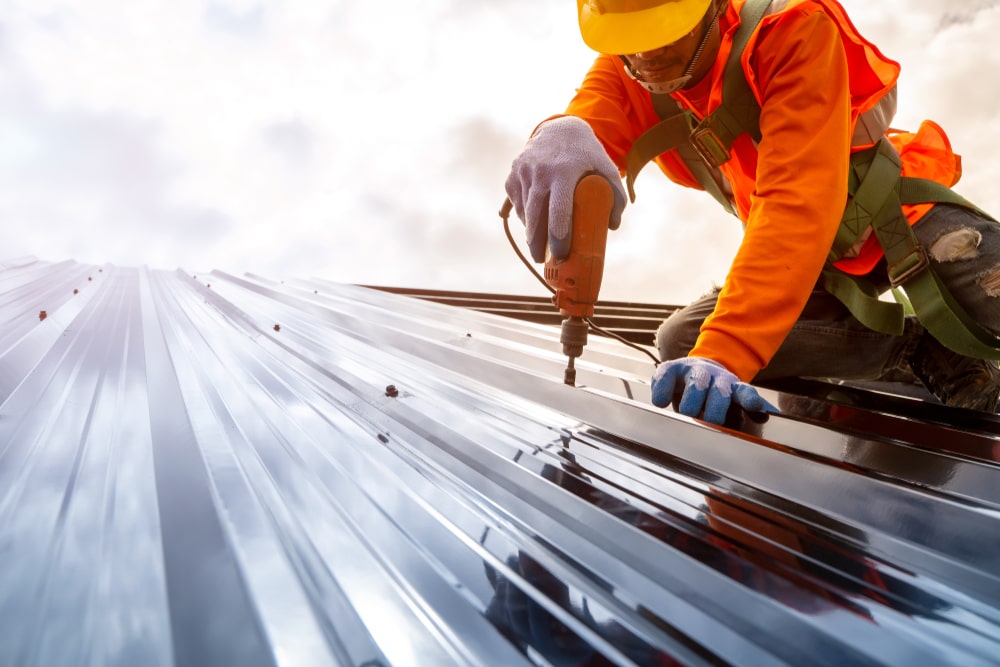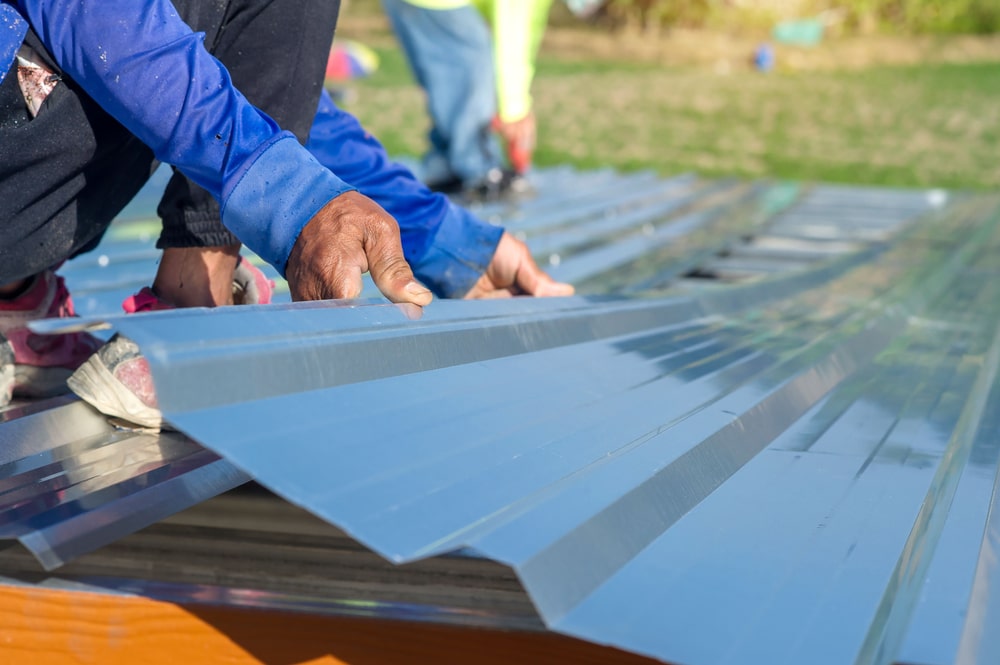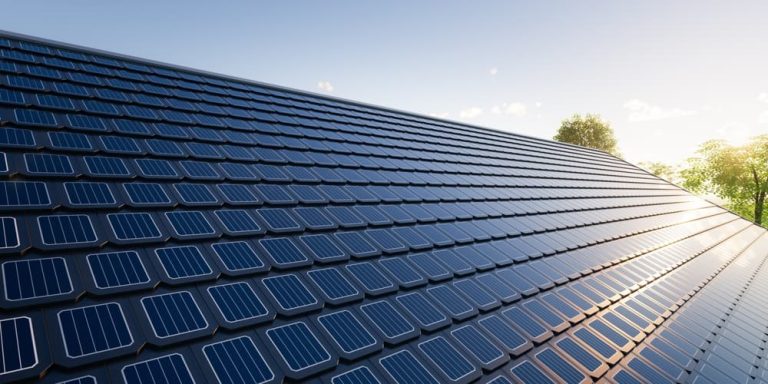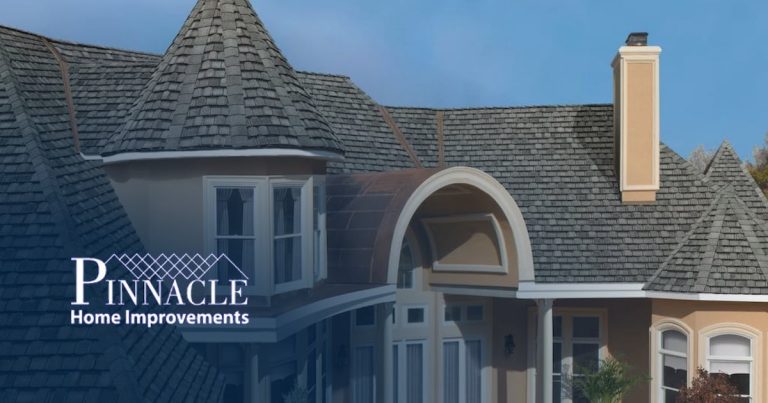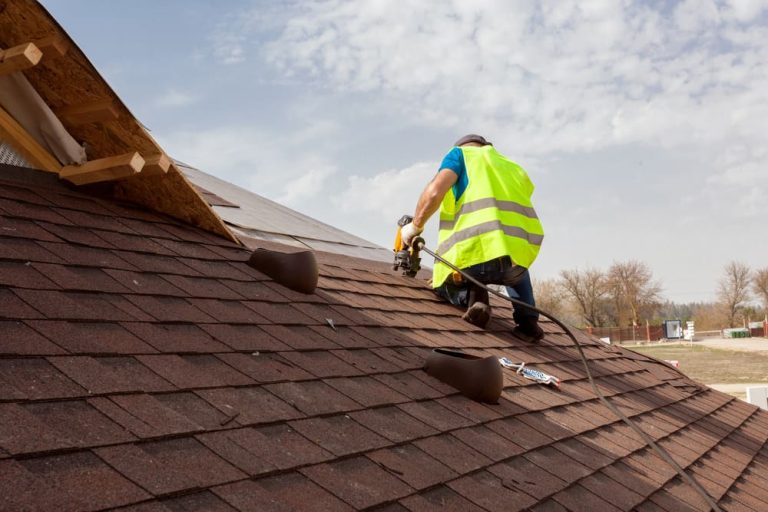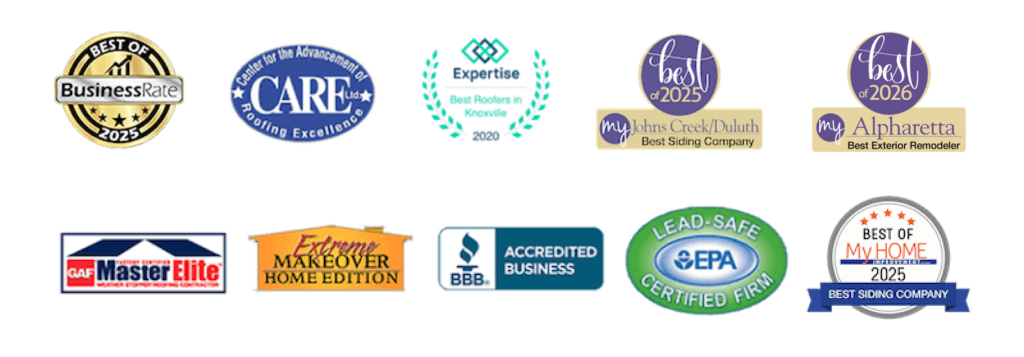Metal roofing provides an excellent option for homeowners that can last for years to come. While it was once typically only used on commercial properties, there has been a huge increase in demand in more recent years for metal roofing on homes.
While it has many advantages, metal roofing isn’t the best choice for everyone. It is vital to seek a trusted roofing contractor who can help you determine if you should use metal roofing or another material for your roof replacement.
At Pinnacle Home Improvements, we are upfront and transparent about the pros and cons of metal roofs. The purpose of this blog is to provide information to fully understand metal roofing. Once you read through the pros and cons of metal roofs, explore our key services and specialties. When you’re ready to replace your roof, contact us, and we can explain more about metal roofing as well as whether it is a viable option for your home. We can provide you with a free quote for your roof replacement, whether you choose metal roofing or another material for your project.
4 Myths About Metal Roofing
Metal roofing has long been a popular roofing material for commercial buildings. Now it is becoming more sought-after for residential properties. However, there are a few myths regarding metal roofing that need to be addressed.
1. Myth: Metal Roofs Have a Commercial Look
Metal roofs come in many design styles and colors these days, and many of them do not look like metal or tin roofs you’d see on a restaurant or other commercial property.
2. Myth: Metal Roofs Last Forever
Metal roofs do not last forever, but they can often last for 50 years or longer, as long as they are properly installed and maintained.
3. Myth: Metal Roofs Make an Interior Hotter
One of the greatest advantages of metal roofing is that it reflects solar radiant heat. This means you will reduce your cooling costs on hot summer days.
4. Myth: You Can’t Do Anything to Stop the Noise of Metal Roofs
While it is true that metal roofs will cause more noise when there is a heavy rain storm or hail, there are ways to mitigate and dampen the sound.
The bottom line is this: metal roofs are hardly a perfect roofing material. However, all roofing materials have their pros and cons. Understanding what they are can help you make the right decision when it comes time for your roof replacement.
Whether you have an aging roof that will need a replacement soon or you had damage from a storm, learn the facts about metal roofing. The pros and cons of this roofing material are listed below.
6 Pros of Metal Roofs
There are many pros to installing a metal roof on your home. Durability, energy efficiency, and aesthetics are among the top advantages for residential properties. Read on to learn more about the pros of metal roofing.
1. Durability and Longevity
One of the biggest advantages of metal roofing is that it is one of the most durable roofing materials. Its lifespan tends to range from 40 to 70 years, depending on the material, with some types lasting even longer.
Compared to asphalt shingle roofs, which is one of the most common choices for homes, that is a huge difference. Asphalt shingle roofs have a 20-year lifespan average. Since metal roofing can withstand high wind gusts and is usually impact-resistant, it is also built to last. You have less chance of a metal roof cracking or corroding, plus most are fire resistant and require minimal maintenance over the years.
2. Energy Efficiency and Environmental Sustainability
Metal roofs reflect heat, which means you will reduce your cooling costs by 10% to 25%. This material is also completely recyclable at the end of its lengthy lifespan, and since metal roofs are usually made from recycled materials, they are one of the most environmentally sustainable options. Since this roofing material will improve your thermal efficiency, they not only contribute to lower energy bills but also reduce your carbon footprint. As a material that is primarily composed of 30% to 60% recycled content, you will also reduce landfill waste for the next generation.
3. Aesthetic Appeal and Versatility
Metal roofing is available in an incredible array of styles, colors, and finishes, allowing you to easily compliment the architectural design of your home. Whether your home has a traditional style or one that is more contemporary, you can find the right look for it with metal roofing materials.
There are standing seam panels or tiles that look just like clay, slate, and wood, allowing you to enhance your home’s curb appeal while imitating the look of those coveted materials. Since metal roofs can retain their appearance over time with minimal maintenance and they resist fading and chalking, you’ll get the look you want without the stringent need for upkeep like you would with those other materials.
4. Safety Aspects
If you live in an area that is prone to severe thunderstorms or wildfires, metal roofing offers another distinctive advantage in that it is not combustible. This means that it will not ignite if it is hit with lightning or if fires are in your area.
5. Insurance Discounts
You may also get special discounts from your homeowner’s insurance carrier. Many insurers will provide discounted insurance premiums since metal roofing is far more durable, which means there’s less risk in you filing a claim for weather-related damages.
6. Lower Maintenance
Metal roofs are a low-maintenance option, especially when you compare them to other roofing materials. Since they may require less maintenance, you’ll spend less time and money caring for it and will reduce your worries too.
Overall, the performance of a metal roof along with the ability to enhance your home’s aesthetic appeal make it stand out as an excellent option. Its reliability as a roofing solution shows why it is becoming a more common choice for homes across the nation.
5 Cons of Metal Roofs
While metal roofing has many advantages, it is by no means a perfect roofing material. Any material will have cons associated with it, and learning about them will help you decide if it is right for your home.
1. Cost Factors
Metal roofs require a much higher initial investment when compared to other roofing materials. This more expensive upfront cost is countered by its more robust lifespan. If you are planning to live in your home for many more years to come, it is worth the investment. However, if you need to replace your roof ahead of selling your home, you may not want to make that much of an investment.
2. Noisiness During Inclement Weather
When heavy rains or hail fall, they can make the interior of your home much noisier if you have a metal roof. Raindrops will create a drumming effect, which the metal amplifies. Some homeowners find this soothing while others find it disruptive.
Hail is of course much louder, and depending on the size and density of it, the hail can disturb you in your home when you have a metal roof. In general, the noise issues with metal roofs can be worse with a lack of insulation, which will allow the transfer of noise into your living space. Insulation can muffle the noise and help insulate your home, but it must be done correctly to keep the metal roof from being too loud during foul weather.
Additionally, the design, shape, and fastening techniques of a metal roof will also have the potential to influence acoustics. Some designs can reduce the noise while others may amplify it. Choosing the right type and thickness of metal will also play a role in the noise level. If you have thinner materials, you can expect more noise.
Dampening the Sound from Metal Roofs
Fortunately, there are ways to mitigate the noise that can come from metal roofing. If you ensure proper ventilation and insulation, you will reduce the ruckus. High-density foam insulation is typically recommended as it can go underneath the metal roof panels and dampen the sounds. Spray foam insulation can also help, filling gaps and creating a thicker barrier. There are rigid foam boards that can be tailored to the structure as well. In short, there are a variety of insulation options that can keep the inside of your home quiet.
With a quality roofing contractor, you will also be presented with underlayment options that can serve as a sound barrier and absorb the vibrations that create noise. Synthetic underlayment is durable and robust while resisting moisture and dampening sounds. Self-adhering membrane underlayment or peel-and-stick underlayment is great for the roof deck and keeps down the racket. Combining insulation and underlayment is a crucial measure that ensures metal roofing is quieter, leaving you more comfortable at home.
3. Rust and Corrosion Issues
It is important to note that metal roofing can resist rust and corrosion, though it must be properly coated. Even if it is coated, the coating can become damaged. Homeowners who choose metal roofing must make sure to have it inspected at proper intervals to add more coating if needed to uphold this material’s longevity.
What causes a metal roof to rust or corrode? Salty air that is found in coastal areas will accelerate this process. It requires prevention through use of galvanized steel or aluminum, which also adds a protective layer of zinc or a mix of zinc and aluminum to keep it from corroding.
4. Thermal Expansion and Contraction
Thermal expansion and contraction is common for metal roofs as they heat and cool at different intervals throughout the day. This can cause the fasteners to loosen or warp the panels, potentially causing leaks or structural damage. With proper installation, specialized fasteners are used to accommodate these types of movements and prevent these issues.
5. Impact Resistance Concerns
Metal roofing can withstand impacts from a variety of objects from hail to debris or even foot traffic. However, it is not impervious to everything, and it will depend on the material selected as well as the quality of construction and installation. Most metal roofing materials will be impact resistance-rated and you can choose them based on how well they can endure any impacts. If you live in an area prone to severe weather, you can resist it by choosing metal roofing that is rated for the types of impacts you may experience.
How Does Metal Roofing Compare to Other Roofing Materials?
Understanding how metal roofing compares with other popular roofing materials is important to help you make a decision. Each of these materials has its advantages and disadvantages, and none of them is perfect across the board.
Asphalt shingles are one of the most popular choices because they are budget-friendly and easier to install, making the labor costs more affordable. However, they also have a shorter lifespan compared to other materials, especially metal. Slate is a stunning material that provides natural beauty and an elegant look on estates while being known for its longevity. On the downside, it is expensive and incredibly heavy, requiring reinforcement of the roofing structure. Similarly, concrete tiles can be made to mimic the look of other materials and last a long time, but they require added structural support.
Comparing the costs of materials is obviously a concern, though there is more to it than a price tag on materials and labor. Asphalt shingles are more affordable upfront, though you will spend more time and money maintaining them, which contributes to your long-term costs. With metal roofing, you will spend more upfront, though you will enjoy the savings over the years from a longer lifespan and less need for maintenance.
Speaking of maintenance, this is a crucial factor for homeowners when choosing roofing materials. Asphalt shingles will need your attention through regular maintenance to prevent cracking or lifting while metal roofs will not need the same kind of care. Slate can even outlast metal in longevity, though if any tiles crack and break, they can be expensive to fix.
There are also environmental considerations to make with all roofing choices. Since metal roofs are made from recycled materials and can be recycled completely, they are great for those who are concerned about sustainability. Asphalt shingles contribute to more landfill waste while slate and concrete are also be less likely to be replaced but can add to transportation emissions due to their excessive weight. Metal is more energy efficient, which reduces consumption of energy, compared to the other materials.
In the end, it’s worth considering all of the factors beyond price for whether or not you should choose a metal roof. If you need a roof replacement, contact Pinnacle Home Improvements to start the conversation about various materials and which one may be right for your home.
Getting the Most Out of Your Metal Roof
Pinnacle Home Improvements provides high-quality metal roofing solutions through a team of experts with years of experience. We deliver results that combine durability with aesthetics and give our clients exceptional craftsmanship and service.
Our commitment to using only premium materials is something we do not compromise. With our metal roof installations, we enhance your home’s curb appeal while building long-term performance. We put meticulous attention to detail in every roofing project, adhere to industry best practices, and use advanced technology, creating metal roofs that provide you with superior weather resistance, a longer lifespan, and improved energy efficiency.
When you choose Pinnacle Home Improvements for your installation, you are securing a valuable investment in your home. Choosing our professionals means you can rest assured that your home’s resale value will grow and you will enjoy a strong metal roof with minimal maintenance needed.
Contact Pinnacle Home Improvements for Your Roofing Needs, Including Metal Roofing
If you are considering metal roofing, remember that there are pros and cons:
Pros
- Greater durability, with metal roofs lasting between 40 and 70 years, depending on the type of metal used
- Improved energy efficiency through the material’s reflective properties
- Enhanced safety that won’t catch fire if it is struck by lightning or there is a wildfire
- Eco-friendliness, as it is made of recycled materials and is 100% capable of being recycled
Cons
- Higher upfront costs compared to other roofing materials
- More potential for noise, though soundproofing measures can be installed to dampen it
- Potential for expansion and contraction, which needs to be thought of in the design
In short, metal roofs are a great option for a long-term investment, and if you plan to live in your home for your lifetime, it is worth it. You get longevity and performance while saving energy. It comes at a higher cost upfront, but by considering your circumstances and plans for your property, you may find it’s the perfect fit.
If you’re ready to learn more about metal roofing and see whether it’s the right option for your home, contact us with your questions.










